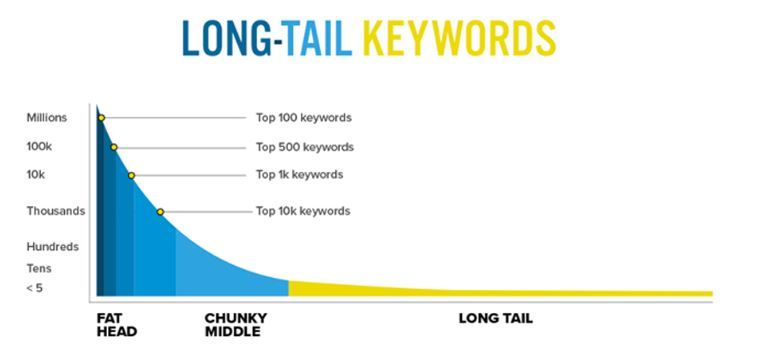If you've been involved in SEO for any length of time, you know that keywords are important. But not all keywords are created equal. In fact, some of the best keywords to target are what are known as long-tail keywords.
What is a long-tail keyword? It's simply a keyword phrase that is more specific and usually longer than a more general, shorter keyword. For example, instead of just targeting the keyword "shoes," a long-tail keyword might be "women's black leather dress shoes.
Here are five benefits of targeting long-tail keywords:
- Long-tail keywords are more specific, which means they are often less competitive than shorter, more general keywords. This means it can be easier to rank for long-tail keywords.
- Long-tail keywords tend to be more targeted toward buyers who are further along in the buying cycle. This means that if you can rank for a long-tail keyword, you are more likely to convert the visitor into a sale.
- Long-tail keywords can be a great way to target niche markets.
- Long-tail keywords can be a great way to improve your search engine optimization (SEO). By targeting long-tail keywords, you can improve your chances of ranking higher in the search engine results pages (SERPs).
- Long-tail keywords can help you to attract more targeted traffic to your website. By targeting keywords that are more specific to your product or service, you can attract visitors who are more likely to be interested in what you have to offer.
What are long-tail keywords?
Long-tail keywords are keywords that are more specific and usually longer than the average keyword. They tend to be less competitive and can be a good way to get traffic to your website. Also, Read in Hindi by Hindi Quiz.
An example of a long-tail keyword would be "how to start a blog for free." This keyword is more specific than just "blogging" and is likely to be less competitive. If you are able to rank for this keyword, you will be able to get traffic from people who are specifically searching for this information.
Long-tail keywords can be a great way to get traffic to your website, especially if you are in a niche market. If you can rank for a long-tail keyword, you will be able to get traffic from people who are specifically searching for that information.
Why use long-tail keywords?
There are a number of reasons why you might want to use long-tail keywords in your marketing efforts. For one, they can be a great way to target a specific audience with your message. Additionally, long-tail keywords tend to be less competitive than shorter, more general keywords, making them a great option for SEO purposes. Finally, long-tail keywords can help you to create more detailed and targeted content, which can be a valuable asset for any marketing campaign.
In short, long-tail keywords can be a helpful tool in a number of different marketing contexts. If you are looking to target a specific audience, improve your SEO efforts, or create more targeted content, long-tail keywords may be the right option for you. Long-tail keywords are what Google Needs

Google needs long-tail keywords because they are more specific and less competitive than short-tail keywords. Long-tail keywords are also more likely to convert because they are more specific to what the searcher is looking for.
For example, if someone is searching for "red shoes," they are more likely to find what they are looking for if they use the keyword phrase "red shoes size 7." Short-tail keywords are more general, such as "shoes" or "red shoes.
Google also needs long-tail keywords because they help to improve the quality of search results. When users search for specific keywords, Google can more easily match them with relevant websites and content. This, in turn, helps to improve the overall quality of the search results.
If you want to improve your website's ranking in search results, you should focus on using long-tail keywords. These keywords are more specific and relevant to what users are searching for, so they are more likely to result in a conversion. In addition, long-tail keywords can help to improve the quality of your website's search results.
How To Discover long-tail keywords?
There are a number of ways to discover long-tail keywords. One way is to use a keyword research tool like Google AdWords Keyword Planner or Keyword Tool.io.
Another way is to simply brainstorm a list of potential keywords and then use a tool like Google Trends to see which of those keywords are being searched for the most.
Finally, you can also look at your website's search data to see which keywords are being used most often to find your site.
Once you have a list of potential long-tail keywords, you can then start incorporating them into your content. Use them in your titles, in your meta descriptions, and throughout your body copy. Technology News The more you use them, the more likely you are to rank for them. And, of course, don't forget to use them in your website's keywords so that your site can be easily found by those who are searching for your products or services.





